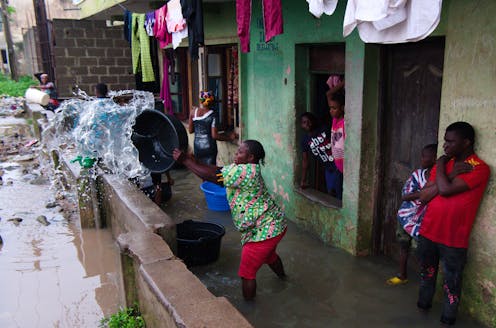
Flooding is not unusual in Nigeria’s massive, population-dense cities. But this year’s floods are reportedly the country’s worst in a decade. They’ve killed more than 600 people, displaced 1.4 million residents and destroyed 89,348 houses and 70,566 hectares of farmland and crops.
The severe flooding has had a significant impact on some states in the south of the country, including Anambra, Delta, Rivers, Cross River and Bayelsa. Adamawa, Gombe, Jigawa, parts of Kaduna, Kogi, Niger, Benue and Nasarawa in the country’s north have also been hit hard.
This year’s rainfall has been higher than usual in both the south and the north. The volume of rainfall has exacerbated the effects of the annual release of excess water from Cameroon’s Lagdo Dam. The dam is on the Benue river, which runs through Nigeria.
Over the years, the government has taken several measures to mitigate and manage the effects of floods. These include providing food, warm clothes and temporary shelter for flood victims. The Nigerian Meteorological Agency has also developed early warning systems and the federal government established the Ministry of Humanitarian Affairs, Disaster Management and Social Development in 2019 to coordinate disaster risk reduction activities.
These measures have not helped, especially as flooding is now an annual occurrence. In fact there is some evidence that the effects of floods have worsened in recent years due to a lack of coordination among various government agencies.
In previous research I established that many factors contribute to flooding in Nigerian cities. These include poor drainage systems, the indiscriminate dumping of refuse and haphazard physical developments. Climate change plays a role, too; research shows that climatic shifts are increasing the intensity and frequency of storm systems in Africa. The recent Intergovernmental Panel on Climate Change report also predicted an upward trend in extreme rainfall events for sub–Saharan African communities.
Given these realities, how do residents cope? In a recently published article I examined the flood resilience strategies of residents in Nigeria’s Kaduna metropolis. Kaduna is the capital city of Kaduna State, and the former political capital of northern Nigeria. The city’s southern area is flood-prone and is among those hit by the recent floods.
Read more: What Nigerian cities can do to cope better with flood risk
I found that households’ ability to prevent, cope with and reduce flood risks is determined by their income, housing, transport, drainage and road facilities.
My hope is that this study will provide information that could be useful to policy makers to make Nigerian cities safer and more resilient to floods.
Household resilience
I interviewed residents from 357 households – ranging from low to high income – and found that they employed various tactics to survive the floods. Across the study area, strategies were similar in that they were reactive rather than anticipatory. This is because adequate flood preparedness requires collaborative efforts from government and other relevant stakeholders, including households. Such efforts did not exist.
In high income areas, I heard how community members raised funds to clear drains and waterways and to repair and replace damaged bridges. Some community leaders also sought to educate residents about flood preparedness through public dialogue and religious institutions.
In the low and medium income communities, sandbags were used to keep some floodwaters at bay. People also temporarily moved away from their homes when there was flooding, shifting what they could of their belongings and properties to higher ground. They sought financial and accommodation support from civil society organisations, government and nongovernmental agencies.
When I asked residents about what motivated them to move to safe places, respondents in all income brackets said their main concern was “keeping the family unit together”.
My results show that household resilience strategies are typically short-term in nature, regardless of income brackets. They also failed to effectively help households offset impacts such as loss of jobs and displacements due to flooding.
Way forward
Inadequate support from government leaves residents largely to their own devices when it comes to flood mitigation.
In my view, the Nigerian government at all levels must engage residents, and other relevant stakeholders, to implement both short and long-term solutions. These must be designed to reduce and overcome the impacts of flooding in Nigerian cities.
The starting point is the sensitisation of residents and businesses located in high-risk areas. They need to know what to do in times of flooding to minimise the negative effects. Similarly, all stakeholders’ roles, obligations and responsibilities before, during and after flooding need to be clearly identified and tied to specific government agencies for further support.
Read more: Nigeria has a flooding challenge: here's why and what can be done
In addition, the federal government must collaborate with state governments to ensure that appropriate environmental and development control laws are strictly enforced. This will prevent new development on wetlands and floodplains and ensure that new development follows flood-resilient standards when building in coastal areas.
Residents also need to embrace a collaborative approach to handling flood issues. This should be done through knowledge sharing and coordinated efforts to help them advance their local coping strategies. Social learning is one key aspect that households should embrace to communicate, share experiences, ideas and resources and plan collective action.
Olasunkanmi Habeeb Okunola does not work for, consult, own shares in or receive funding from any company or organisation that would benefit from this article, and has disclosed no relevant affiliations beyond their academic appointment.
This article was originally published on The Conversation. Read the original article.







